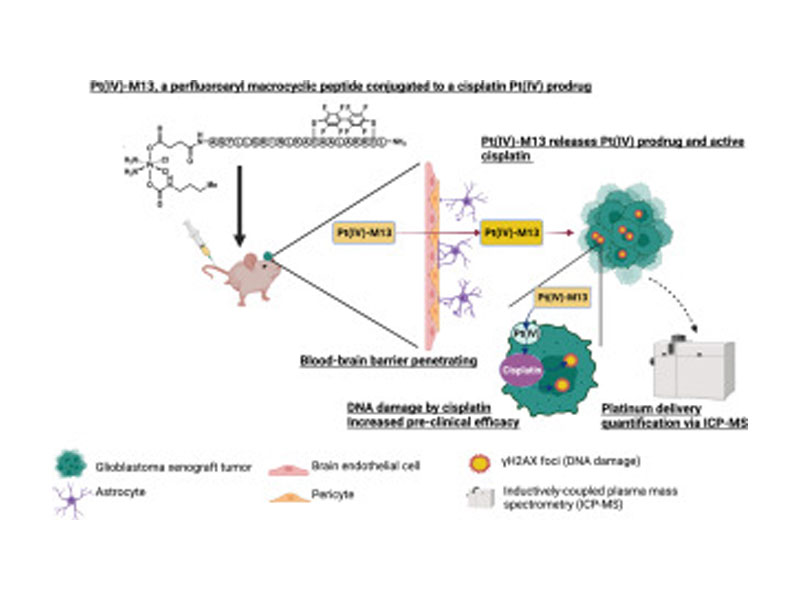
A Pt(IV)-conjugated brain penetrant macrocyclic peptide shows pre-clinical efficacy in glioblastoma

A Pt(IV)-conjugated brain penetrant macrocyclic peptide shows pre-clinical efficacy in glioblastoma
Journal of Controlled Release Volume 352, December 2022, Pages 623-636
J.L. Jimenez-Macias, Y.-C. Lee, E. Miller, T. Finkelberg, M. Zdioruk, G. Berger, C.E. Farquhar, M.O. Nowicki, C.-F. Cho, B.I. Fedeles, A. Loas, B.L. Pentelute, S.E. Lawler
Abstract
Glioblastoma (GBM) is the most aggressive primary malignant brain tumor, with a median survival of approximately 15 months. Treatment is limited by the blood-brain barrier (BBB) which restricts the passage of most drugs to the brain. We previously reported the design and synthesis of a BBB-penetrant macrocyclic cell-penetrating peptide conjugate (M13) covalently linked at the axial position of a Pt(IV) cisplatin prodrug. Here we show the Pt(IV)-M13 conjugate releases active cisplatin upon intracellular reduction and effects potent in vitro GBM cell killing. Pt(IV)-M13 significantly increased platinum uptake in an in vitro BBB spheroid model and intravenous administration of Pt(IV)-M13 in GBM tumor-bearing mice led to higher platinum levels in brain tissue and intratumorally compared with cisplatin. Pt(IV)-M13 administration was tolerated in naïve nude mice at higher dosage regimes than cisplatin and significantly extended survival above controls in a murine GBM xenograft model (median survival 33 days for Pt(IV)-M13 vs 24 days for Pt(IV) prodrug, 22.5 days for cisplatin and 22 days for control). Increased numbers of γH2AX nuclear foci, biomarkers of DNA damage, were observed in tumors of Pt(IV)-M13-treated mice, consistent with elevated platinum levels. The present work provides the first demonstration that systemic injection of a Pt(IV) complex conjugated to a brain-penetrant macrocyclic peptide can lead to increased platinum levels in the brain and extend survival in mouse GBM models, supporting further development of this approach and the utility of brain-penetrating macrocyclic peptide conjugates for delivering non-BBB penetrant drugs to the central nervous system.



